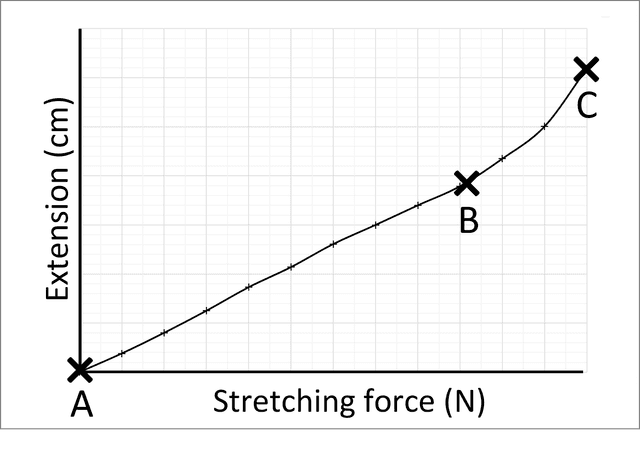Myths about teaching can hold you back


- Year 10•
- OCR•
- Foundation
Stretching a spring practical
I can measure the extension of a spring and describe its properties as it increases in length.


- Year 10•
- OCR•
- Foundation
Stretching a spring practical
I can measure the extension of a spring and describe its properties as it increases in length.
These resources were made for remote use during the pandemic, not classroom teaching.
Switch to our new teaching resources now - designed by teachers and leading subject experts, and tested in classrooms.
Lesson details
Key learning points
- Stretching or compressing an object requires more than one force.
- Below the limit of proportionality, a stretched spring is not stretched permanently out of shape.
- Above the limit of proportionality, a stretched spring is stretched permanently out of shape.
Keywords
Extension - The increase from the original length of a spring when it is stretched.
Elastic deformation - The stretch of a spring that returns to its original shape when the stretching force is removed.
Inelastic deformation - The stretch of a spring as it is permanently stretched out of shape.
Limit of proportionality - The largest extension of a spring before it is stretched out of shape.
Common misconception
Extension is the extra amount the spring has stretched when a bigger force is applied.
Ensure pupils fully remove each hanging mass between measurements so they see the extension of the spring from its original length each time.
To help you plan your year 10 physics lesson on: Stretching a spring practical, download all teaching resources for free and adapt to suit your pupils' needs...
To help you plan your year 10 physics lesson on: Stretching a spring practical, download all teaching resources for free and adapt to suit your pupils' needs.
The starter quiz will activate and check your pupils' prior knowledge, with versions available both with and without answers in PDF format.
We use learning cycles to break down learning into key concepts or ideas linked to the learning outcome. Each learning cycle features explanations with checks for understanding and practice tasks with feedback. All of this is found in our slide decks, ready for you to download and edit. The practice tasks are also available as printable worksheets and some lessons have additional materials with extra material you might need for teaching the lesson.
The assessment exit quiz will test your pupils' understanding of the key learning points.
Our video is a tool for planning, showing how other teachers might teach the lesson, offering helpful tips, modelled explanations and inspiration for your own delivery in the classroom. Plus, you can set it as homework or revision for pupils and keep their learning on track by sharing an online pupil version of this lesson.
Explore more key stage 4 physics lessons from the Energy of moving objects unit, dive into the full secondary physics curriculum, or learn more about lesson planning.

Equipment
Apparatus to measure the extension of a 'Hooke's Law spring' to destruction with hanging masses of 12.0 N in 1.0 N increments.
Content guidance
- Risk assessment required - equipment
Supervision
Adult supervision required
Licence
Prior knowledge starter quiz
6 Questions
Q1.The energy an object has because it is moving is in the energy store.
Q2.The energy an object has because it is stretched or squashed is in the energy store.
Q3.Friction or air resistance can cause energy to into the surroundings.
Q4.An object hangs from a rope.
Which of the follwoing is equal to the force exerted on the rope by the object?
Q5.An object has mass 5 kg.
Which of following is closest to the weight of the object?
Q6.The following graphs plot variable 1 on the $$x$$–axis and variable 2 on the $$y$$–axis.
On which graph is variable 1 directly proportional to variable 2?
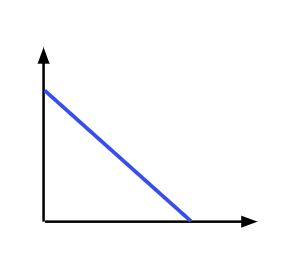
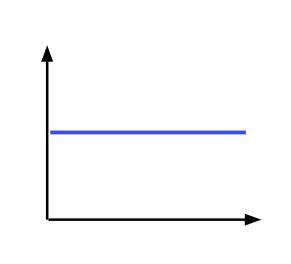
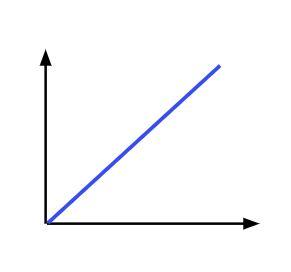
Assessment exit quiz
6 Questions
Q1.Match the following terms to their definitions (for a spring).
extension -
the difference between the spring's stretched and unstretched length
elastic deformation -
a reversible (temporary) change in length of a spring
inelastic deformation -
a permanent change in length of a spring
Q2.The diagram shown is of a spring in its unstretched state and when it is stretched.
Which arrow, A, B, C, or D, shows the extension of the stretched spring?
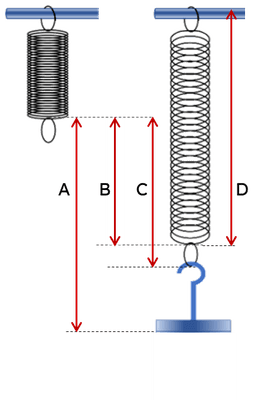
Q3.The limit of proportionality of a spring is the largest possible extension before the spring …
Q4.The following graph shows the extension of a spring against the stretching force.
Which point, A, B, or C, shows the position of the limit of proportionality?
